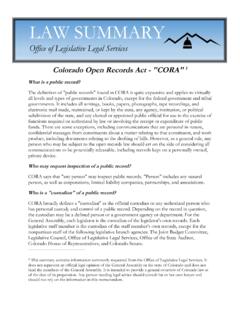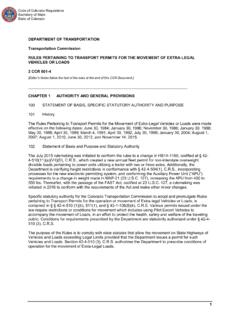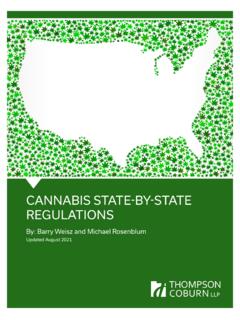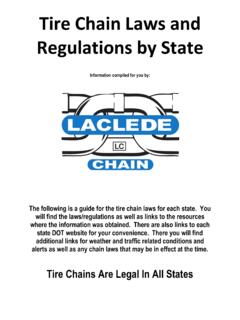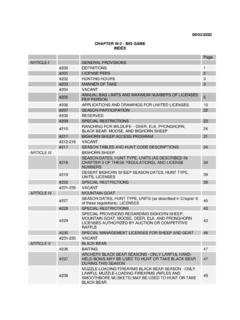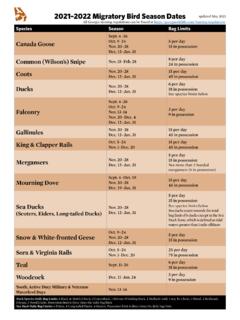Transcription of LAW SUMMARY - Colorado
1 Colorado DRUNK DRIVING LAWS 1 Colorado law prohibits a person from driving a vehicle while under the influence of alcohol or drugs or while the person's ability to drive is impaired by alcohol or These offenses are often abbreviated as "DUI" and "DWAI", respectively. Blood tests and breath tests play a prominent role in the enforcement of drunk driving laws, although DUI or DWAI can be proved by other means. If at the time of the commission of an alleged offense, or within a reasonable time thereafter, a defendant's BAC exceeds but is less than , there is a permissible inference that the defendant's ability to operate a vehicle was impaired by the consumption of alcohol. If the defendant's BAC is or more, there is a permissible inference that the defendant was under the influence of Similarly, if at the time of an offense, or within a reasonable time thereafter, a defendant's blood contains 5 nanograms or more of delta-9 THC (the active substance in marijuana) per milliliter in whole blood, there is a permissible inference that the defendant was under the influence of one or more A person may be classified as a persistent drunk driver and subject to greater penalties if the test shows a blood alcohol level of at least 1 This SUMMARY contains information commonly requested from the Office of Legislative Legal Services.
2 It does not represent an official legal opinion of the General Assembly or the state of Colorado and does not bind the members of the General Assembly. It is intended to provide a general overview of Colorado law as of the date of its preparation. Any person needing legal advice should consult his or her own lawyer and should not rely on the information in this memorandum. 2 "Driving under the influence" means driving a vehicle when a person has consumed alcohol or one or more drugs, or a combination of alcohol and one or more drugs, that affects the person to a degree that the person is substantially incapable, mentally or physically, to exercise clear judgment, sufficient physical control, or due care in the safe operation of a vehicle. Section 42-4-1301 (1) (f), "Driving while ability impaired" is similar, except that a person need only be affected to the slightest degree so that the person is less able to drive than the person ordinarily would have been.
3 Section 42-4-1301 (1) (g), 3 Section 42-4-1301 (6), 4 Section 42-4-1301 (6), LAW SUMMARY Office of Legislative Legal Services Page 2 of 4 The law presumes that every driver has consented to take a blood, breath, saliva, or urine test when requested to do so by a law enforcement officer who has probable cause to believe that the person is DUI or Refusal to take the test is both admissible in court and a basis for revocation of a driver's license. There are both criminal penalties (fines, imprisonment, and required public service) and administrative penalties for drunk driving. Courts impose criminal penalties, and the Colorado Department of Revenue (the Department) imposes the administrative penalties. Administrative penalties include the suspension or revocation of a license due to the commission of certain offenses or due to the accumulation of sufficient points assessed for violations.
4 Sometimes a driver may reduce the driver's criminal penalties through a plea bargain in court or by undergoing alcohol or drug treatment, but the driver must still face administrative penalties enforced by the Department. In most cases, the Department does not have the authority to reduce or bargain away these penalties. The following tables summarize the administrative and criminal penalties6 for DUI and DWAI as they appear in sections 42-2-125, 42-2-126, 42-2-127, and 42-4-1307, Colorado Revised Statutes: ADMINISTRATIVE PENALTIES Violation License Suspension Points BAC test of at least 9 months 2nd BAC test of at least 12 months 3rd or subsequent BAC test of at least 24 months DWAI None 8 points 1st DUI 9 months 12 points 5 Section , 6 Administrative penalties for the same incident are not consecutive.
5 For example, if a person whose license was suspended for a BAC test of at least is subsequently convicted of DUI arising out of the same incident, the person's license is only suspended once. Page 3 of 4 ADMINISTRATIVE PENALTIES Violation License Suspension Points 2nd DUI or DWAI 12 months DWAI 8 points DUI 12 points 3rd DUI or DWAI 24 months DWAI 8 points DUI 12 points 1st Under 21 drinking and driving (BAC of at least but less than ) 3 months 1st offense 6 months 2nd offense 1 year 3rd or subsequent offense 4 points CRIMINAL PENALTIES Offense Classification Jail/Imprisonment Fine/Parole Public Service 1st DWAI Misdemeanor 2 - 180 days jail $200-$500 fine 24 hrs - 48 hrs 1st DUI or DUI per se Misdemeanor 5 days - 1 year jail $600-$1000 fine 48 hrs - 96 hrs DWAI or DUI with 1 previous DWAI or DUI Misdemeanor 10 days - 1 year jail $600-$1500 fine 48 hrs - 120 hrs DWAI or DUI with 2 previous DWAI or DUI Misdemeanor 60 days - 1 year jail $600-$1500 fine 48 hrs - 120 hrs DWAI or DUI with 3 or more previous DWAI or DUI Class 4 felony 2 - 6 years imprisonment 3 years parole 48 hrs - 120 hrs 1st Under 21 drinking and driving (BAC for at least but less than )
6 Class A traffic infraction or Class 2 traffic misdemeanor for subsequent offenses None; 10 - 90 days jail $15 - $100 fine; $150 - $300 fine Up to 24 hrs. Page 4 of 4 In some cases, a portion of the minimum mandatory jail sentence can be suspended if the person agrees to undergo an alcohol treatment program. In addition, persons who violate the state's drunk driving laws may have to pay court costs, penalty surcharges of up to $500 to help pay for programs to address persistent drunk drivers, surcharges to benefit the crime victim compensation fund, fees to reinstate a driver's license after suspension or revocation, and other fees, charges, and penalties. Still other consequences may follow. If alcohol or drugs are involved in an accident causing injury or death, the penalties for vehicular assault or vehicular homicide are more stringent.
7 Persons convicted of a third DUI or DWAI offense within seven years also face a mandatory five-year license revocation under the "habitual traffic offender" statute, section 42-2-202, Colorado Revised Statutes. This SUMMARY does not include all the details contained in state law and regulations . For more information, contact your local driver's license office or visit a public library and ask for title 42 of the Colorado Revised Statutes to review sections 42-2-125 to 42-2-208 (administrative point system and revocation procedures), 42-4-1301 (general DUI statute), and 42-4-1307 (penalties for traffic offenses involving alcohol and drugs). LAST REVISED: 9/1/21 S:\PUBLIC\LLS\MEMOS\Law Summaries\
